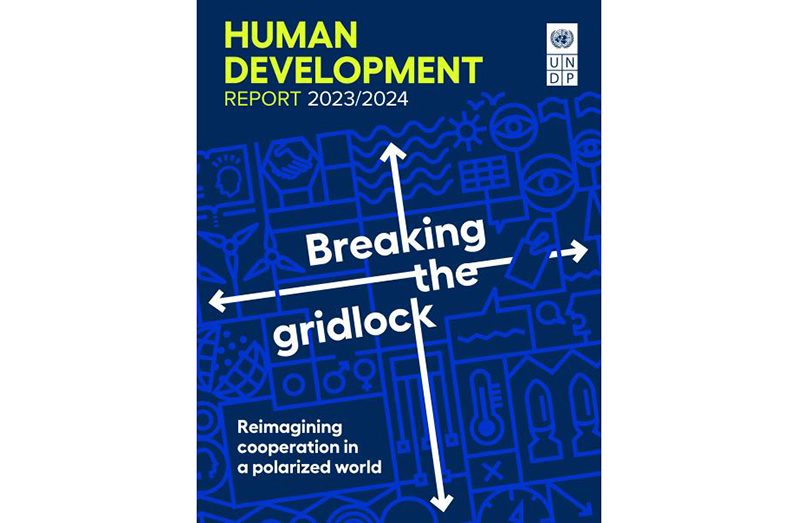GUYANA’S level of human development has increased from 2021, according to the 2023/24 United Nations Development Programme (UNDP) Human Development Index (HDI) released this week. The report is titled: “Breaking the Gridlock: Reimagining Cooperation in a Polarized World”.
The country’s HDI value for 2022 is 0.742 which puts in the high human development category, positioning it at 95 out of 193 countries and territories.
For 2021, Guyana’s HDI score was 0.714, a 0.007 decrease from the previous year, which put it at number 108 out of 191 countries. In 2020, Guyana registered an HDI score of 0.721.
In 2022, Saint Kitts and Nevis, the highest-ranked Caribbean Community (CARICOM) country, had an HDI point of 0.838, placing it at number 51. This is a change of 0.006 per cent from the 2021 result.
The next-highest CARICOM nation was Antigua and Barbuda, at 54, with an HDI index of 0.826—a 0.007 per cent variation from its 2021 value. The Bahamas came in third, at 57, with an HDI index of 0.920, a 0.021 variation from its 2021 values.
With an HDI score of 0.814 and a difference of 0.010, Trinidad and Tobago came in at number 60. Barbados came in at number 62 with an HDI rating of 0.809 and a difference of 0.006 per cent, while Grenada came in at number 73 with an HDI index of 0.793 and a difference of 0.005 per cent.
With an HDI index of 0.772 and a difference of 0.007 per cent, St. Vincent and the Grenadines ranked 81st; Guyana, with an HDI of 0.742 and a difference of 0.021 per cent, ranked 95th; Dominica, with an HDI index of 0.740 and a difference of 0.003 per cent, ranked 97th.
As per the UNDP report, Belize came in at number 118 with an HDI index of 0.700 and a difference of 0.002 per cent, while St. Lucia is at number 108 with an HDI index of 0.690 and a difference of 0.001 per cent. Jamaica is at number 115 with an HDI index of 0.706 and a difference of 0.002 per cent. With an HDI index of 0.690 and a difference of 0.001 per cent, the Dutch-speaking nation of Suriname ranked 124th, while the French-speaking nation of Haiti was ranked 158th in the region with an HDI index of 0.0552 and a difference of 0.001 per cent.
FALLING SHORT
Further, the report said that in the case of Latin America and the Caribbean (LAC), the data show contrasts and the heterogeneity characteristic of the region. It noted that LAC is the region that experienced the sharpest drop in the HDI in 2020-2021, and while it significantly improved in 2022, it failed to reach pre-pandemic levels of progress.
Countries in the LAC region are: Antigua and Barbuda, Argentina, Bahamas, Barbados, Belize, Bolivia, Brazil, Chile, Colombia, Costa Rica, Cuba, Dominica, Dominican Republic, Ecuador, El Salvador, Grenada, Guatemala, Guyana, Haiti, Honduras, Jamaica, Mexico, Nicaragua, Panama, Paraguay, Peru, Saint Kitts and Nevis, Saint Lucia, Saint Vincent and the Grenadines, Suriname, Trinidad and Tobago, Uruguay, and the Bolivarian Republic of Venezuela.
“The widening human development gap revealed by the report shows that the two-decade trend of inequality reduction between wealthy and poor nations is now reversed. Despite our deeply interconnected global societies, we are falling short. We must leverage our interdependence as well as our capacities to address our shared and existential challenges and ensure people’s aspirations are met,” said Achim Steiner, head of the UN Development Programme.
“This gridlock carries a significant human toll. The failure of collective action to advance efforts on climate change, digitalisation or poverty and inequality not only hinders human development, but also worsens polarization and further erodes trust in people and institutions worldwide.”
The report argues that advancing international cooperation is hindered by an emerging ‘democracy paradox’. Worldwide and in the LAC, it said, nine in 10 people value democracy.
However, it pointed out that there is an increasing dissatisfaction with democracy in the region, particularly among women and vulnerable populations.
“The region is also experiencing the most rapid rise in political polarization in the world and, according to Latinobarómetro, trust in institutions has decreased significantly to close to 20 per cent. That is, only 1 in 5 people expressed trust in their government,” the report added.
The report puts forward bold ideas for action to build global cooperation. These include pushing back on polarization, closing the agency gap, and investing in global public goods.
“While these ideas might seem audacious, and perhaps, unreachable in a context of deep polarization, this is what Human Development Reports are meant to do – plant the seeds of ideas that have the potential to change the development paradigm putting people at the centre,” said Michelle Muschett, Assistant Administrator and Regional Director of UNDP for Latin America and the Caribbean.
“This Human Development Report is an invitation to look forward and reimagine cooperation to face the interconnected challenges that threaten our world. There is no other way to get out of the gridlock,” Muschett emphasised.
The 2023/24 Human Development Report assesses the dangerous gridlock resulting from uneven development progress, intensifying inequality, and escalating political polarization, that must be urgently tackled. The report stresses how global interdependence is being reconfigured and proposes a path forward where multilateralism plays a pivotal role.











